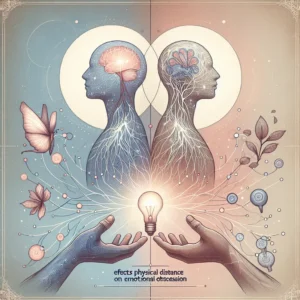Hello, relationship seekers!
Today, we’re diving deep into an important question about relationships: “Why does physical distance in a relationship amplify emotional obsession neurologically?”
The Direct Answer
Physical distance can amplify emotional obsession in relationships due to a phenomenon known as the “Scarcity Principle”. This principle, grounded in psychological research, suggests that we value things more when they are less available. In the context of relationships, the physical absence of a partner can make their emotional presence feel more desirable or important, often leading to heightened emotional obsession. In addition, neurologically, our brain’s reward system can become more active when we desire something we can’t have, leading to amplified feelings of obsession.
Now, let’s explore the extensive evidence and details that support this answer:
1. The Scarcity Principle and Relationships
The Scarcity Principle is a fundamental psychological concept that plays a pivotal role in many aspects of human behavior, including relationships.
A. Understanding the Scarcity Principle
The Scarcity Principle suggests that people place a higher value on an object or person that is less available.
– Expert Perspectives: Relationship and behavioral experts like Dr. Robert Cialdini have explored this concept extensively in their works. According to him, “the idea of potential loss plays a large role in human decision making. In fact, people seem to be more motivated by the thought of losing something than by the thought of gaining something of equal value.”
– Psychological Research: Numerous studies, such as those conducted by Stephen Worchel, Jerry Lee, and Akanbi Adewole, have shown that the perceived value of an object increases when it is scarce or hard to get.
– Real-World Examples: In relationships, when a partner is physically distant, their perceived value can increase, leading to increased emotional obsession.
B. Scarcity Principle in Relationships
The Scarcity Principle not only affects our perceptions of value but also our emotional responses in relationships.
– Historical Context: Historically, long-distance relationships were often romanticized, further cementing the idea of “absence makes the heart grow fonder” in our collective conscience.
– Common Challenges: A common challenge in long-distance relationships is managing the heightened emotional obsession that can arise due to the physical distance.
– Practical Applications: Understanding the Scarcity Principle can help individuals manage their emotional responses in a relationship better.
C. Scarcity Principle and Emotional Obsession
The Scarcity Principle can lead to amplified emotional obsession, particularly in long-distance relationships.
– Expert Perspectives: According to therapist and relationship expert, Esther Perel, “In love, there’s an elastic tension between security and mystery, comfort and novelty, and too much distance can make the relationship snap.”
– Psychological Research: Studies like those conducted by Dr. Helen Fisher suggest that our brain’s reward system can become overactive when we desire something we can’t have, leading to amplified feelings of obsession.
– Real-World Examples: Long-distance couples often report feeling an intense emotional obsession over their partner, a feeling that can be explained by the Scarcity Principle.
2. The Neurology of Obsession
The neurological aspect of emotional obsession in relationships is equally important to understand.
A. The Role of Dopamine
Dopamine, often referred to as the “reward chemical,” plays a significant role in emotional obsession.
1. Dopamine and Reward: When we desire something, including closeness with a distant partner, our brain releases dopamine. This release makes us feel good, thereby increasing our desire for the object of our obsession.
2. Dopamine and Scarcity: Studies have shown that the scarcity of a reward can enhance the dopaminergic response, thereby increasing emotional obsession.
3. Dopamine in Long-Distance Relationships: In long-distance relationships, the physical distance and thus the scarcity of physical contact can increase the brain’s dopamine response, leading to heightened emotional obsession.
B. The Role of the Anterior Cingulate Cortex (ACC)
The ACC, a part of the brain associated with longing and desire, is another key player in emotional obsession.
1. ACC and Longing: The ACC is more active when we long for something or someone. In long-distance relationships, the physical absence of a partner can activate the ACC, leading to increased emotional obsession.
2. ACC and Love: Research conducted by Dr. Helen Fisher and her team found that the ACC is one of the key brain regions activated in people who are deeply in love.
3. ACC in Long-Distance Relationships: The activation of the ACC in long-distance relationships can lead to heightened feelings of longing and emotional obsession.
3. Practical Strategies to Manage Emotional Obsession
Understanding the psychological and neurological roots of emotional obsession is one thing but adopting practical strategies to manage these feelings is equally important.
A. Communication and Emotional Regulation
Effective communication and emotional regulation strategies can help manage emotional obsession in long-distance relationships.
– Open and Honest Communication: Keeping communication lines open and honest can help mitigate feelings of scarcity. Regularly expressing thoughts and feelings to your partner can help both parties feel more connected.
– Emotional Regulation Techniques: Techniques like mindfulness, meditation, and cognitive-behavioral strategies can help individuals manage their emotional responses more effectively.
B. Creating a Balance
Creating a balance between autonomy and connection can help reduce emotional obsession.
– Fostering Autonomy: Fostering a sense of individual autonomy can help reduce feelings of dependence and obsession.
– Maintaining Connection: Regular virtual dates, sharing daily routines, and planning future visits can help maintain a sense of connection, reducing the impact of physical distance.
Conclusion: The Definitive Answer
Based on all the evidence we’ve examined:
– The Scarcity Principle: The Scarcity Principle plays a crucial role in amplifying emotional obsession in long-distance relationships, increasing the perceived value of the distant partner.
– Neurological Factors: Neurologically, the brain’s reward system, involving dopamine and the ACC, becomes more active in response to the desire for a physically distant partner, leading to increased emotional obsession.
– Practical Strategies: Practical strategies like effective communication, emotional regulation, and creating a balance between autonomy and connection can help manage emotional obsession.
In conclusion, physical distance in a relationship can amplify emotional obsession neurologically due to psychological principles like the Scarcity Principle and neurological factors involving the brain’s reward system. However, by understanding these factors and employing practical strategies, individuals can better manage their emotional responses in long-distance relationships. This understanding is crucial in the modern world where long-distance relationships are becoming increasingly common due to factors like global mobility and online dating.



